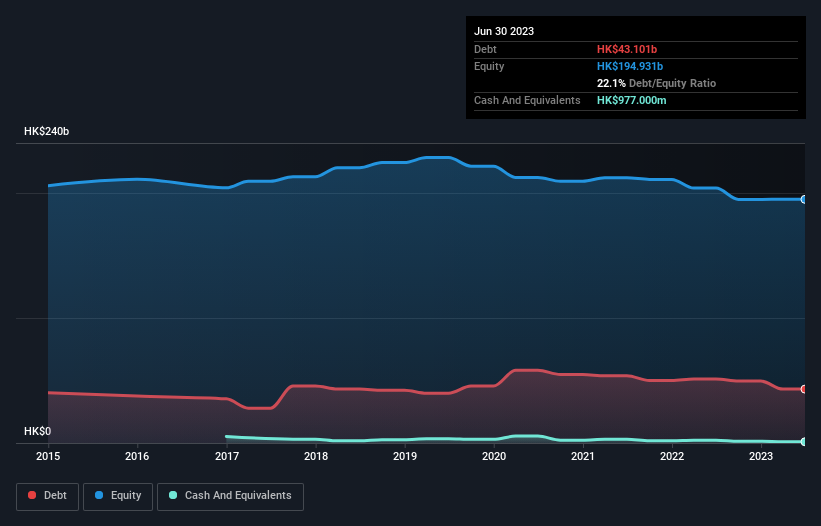- Hong Kong
- /
- Real Estate
- /
- SEHK:1997
We Think Wharf Real Estate Investment (HKG:1997) Can Stay On Top Of Its Debt

Warren Buffett famously said, 'Volatility is far from synonymous with risk.' When we think about how risky a company is, we always like to look at its use of debt, since debt overload can lead to ruin. Importantly, Wharf Real Estate Investment Company Limited (HKG:1997) does carry debt. But is this debt a concern to shareholders?
Why Does Debt Bring Risk?
Debt assists a business until the business has trouble paying it off, either with new capital or with free cash flow. If things get really bad, the lenders can take control of the business. However, a more common (but still painful) scenario is that it has to raise new equity capital at a low price, thus permanently diluting shareholders. Having said that, the most common situation is where a company manages its debt reasonably well - and to its own advantage. When we think about a company's use of debt, we first look at cash and debt together.
See our latest analysis for Wharf Real Estate Investment
What Is Wharf Real Estate Investment's Debt?
You can click the graphic below for the historical numbers, but it shows that Wharf Real Estate Investment had HK$43.1b of debt in June 2023, down from HK$51.1b, one year before. On the flip side, it has HK$977.0m in cash leading to net debt of about HK$42.1b.

How Strong Is Wharf Real Estate Investment's Balance Sheet?
The latest balance sheet data shows that Wharf Real Estate Investment had liabilities of HK$13.6b due within a year, and liabilities of HK$40.1b falling due after that. Offsetting these obligations, it had cash of HK$977.0m as well as receivables valued at HK$1.24b due within 12 months. So its liabilities outweigh the sum of its cash and (near-term) receivables by HK$51.5b.
This is a mountain of leverage relative to its market capitalization of HK$76.2b. Should its lenders demand that it shore up the balance sheet, shareholders would likely face severe dilution.
In order to size up a company's debt relative to its earnings, we calculate its net debt divided by its earnings before interest, tax, depreciation, and amortization (EBITDA) and its earnings before interest and tax (EBIT) divided by its interest expense (its interest cover). The advantage of this approach is that we take into account both the absolute quantum of debt (with net debt to EBITDA) and the actual interest expenses associated with that debt (with its interest cover ratio).
Wharf Real Estate Investment's debt is 4.4 times its EBITDA, and its EBIT cover its interest expense 4.3 times over. This suggests that while the debt levels are significant, we'd stop short of calling them problematic. Fortunately, Wharf Real Estate Investment grew its EBIT by 2.8% in the last year, slowly shrinking its debt relative to earnings. There's no doubt that we learn most about debt from the balance sheet. But it is future earnings, more than anything, that will determine Wharf Real Estate Investment's ability to maintain a healthy balance sheet going forward. So if you want to see what the professionals think, you might find this free report on analyst profit forecasts to be interesting.
Finally, while the tax-man may adore accounting profits, lenders only accept cold hard cash. So we clearly need to look at whether that EBIT is leading to corresponding free cash flow. During the last three years, Wharf Real Estate Investment produced sturdy free cash flow equating to 78% of its EBIT, about what we'd expect. This cold hard cash means it can reduce its debt when it wants to.
Our View
When it comes to the balance sheet, the standout positive for Wharf Real Estate Investment was the fact that it seems able to convert EBIT to free cash flow confidently. But the other factors we noted above weren't so encouraging. For example, its net debt to EBITDA makes us a little nervous about its debt. Looking at all this data makes us feel a little cautious about Wharf Real Estate Investment's debt levels. While we appreciate debt can enhance returns on equity, we'd suggest that shareholders keep close watch on its debt levels, lest they increase. The balance sheet is clearly the area to focus on when you are analysing debt. But ultimately, every company can contain risks that exist outside of the balance sheet. We've identified 1 warning sign with Wharf Real Estate Investment , and understanding them should be part of your investment process.
Of course, if you're the type of investor who prefers buying stocks without the burden of debt, then don't hesitate to discover our exclusive list of net cash growth stocks, today.
Valuation is complex, but we're here to simplify it.
Discover if Wharf Real Estate Investment might be undervalued or overvalued with our detailed analysis, featuring fair value estimates, potential risks, dividends, insider trades, and its financial condition.
Access Free AnalysisHave feedback on this article? Concerned about the content? Get in touch with us directly. Alternatively, email editorial-team (at) simplywallst.com.
This article by Simply Wall St is general in nature. We provide commentary based on historical data and analyst forecasts only using an unbiased methodology and our articles are not intended to be financial advice. It does not constitute a recommendation to buy or sell any stock, and does not take account of your objectives, or your financial situation. We aim to bring you long-term focused analysis driven by fundamental data. Note that our analysis may not factor in the latest price-sensitive company announcements or qualitative material. Simply Wall St has no position in any stocks mentioned.
About SEHK:1997
Wharf Real Estate Investment
An investment holding company, invests in, develops, owns, and operates properties and hotels in Hong Kong, Mainland China, and Singapore.
Moderate growth potential and slightly overvalued.


